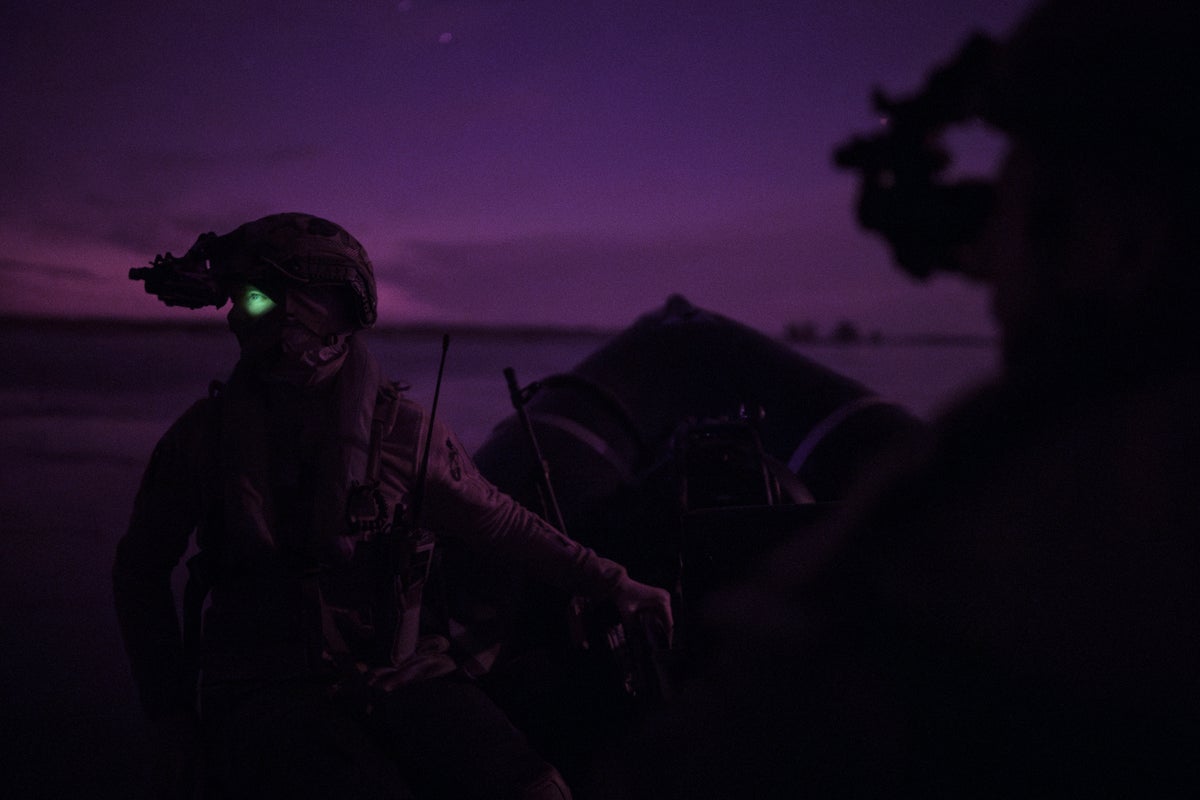
Their first battle plan was outdated the moment the dam crumbled. So the Ukrainian special forces officers spent six months adapting their fight to secure a crossing to the other side of the Dnipro River in southern Ukraine.
But it wasn’t enough just to cross the river. They needed backup to hold it. And for that, they needed proof that it could be done. For one of the officers, nicknamed Skif, that meant a Ukrainian flag — and a photo op.
Skif, Ukrainian shorthand for the nomadic Scythian people who founded an empire on what is now Crimea, moves like the camouflaged amphibian that he is: Calculating, deliberate, until the time to strike.
He is a Center 73 officer, one of Ukraine’s most elite units of special forces — water operations specialists, frontline scouts, drone operators, underwater saboteurs. They are part of the Special Operations Forces that run partisans in occupied territories, sneak into Russian barracks to plant bombs and prepare the ground for reclaiming territory seized by Russia.
Their mission on the more dynamic of the two main fronts in the six-month counteroffensive reflects many of the problems of Ukraine’s broader effort. It’s been one of the few counteroffensive successes for the Ukrainian army.
By late May, the Center 73 men were in place along the river’s edge, some almost within view of the Kakhovka Dam. They were within range of the Russian forces who had controlled the dam and land across the Dnipro since the first days after the February 2022 full-scale invasion. And both sides knew Ukraine’s looming counteroffensive had its sights on control of the river as the key to reclaim the occupied south.
In the operation’s opening days, on June 6, an explosion destroyed the dam, sending a wall of reservoir water downstream and washing out the Ukrainian army positions. An AP investigation found evidence Russia was responsible.
“We were ready to cross. And then the dam blew up,” Skif said. The water rose 20 meters (yards), submerging Skif’s supply lines, the Russian positions and everything else in its path. The race was on: Whose forces could seize the islands when the waters receded, and with them full control of the Dnipro?
AP joined one of the clandestine units several times over six months along the Dnipro. The frogmen are nocturnal. They transform themselves from nondescript civilians into elite fighters, some in wetsuits and some in boats. In the morning, when their operations end, they’re back to anonymity.
They rarely take credit for their work. Ukraine created the special services operations in response to Russia’s lightning-fast annexation of Crimea in 2014, a precursor to the widescale invasion of Ukraine eight years later.
“We realized that we were much smaller in terms of number than our enemy,” said Oleksandr Kindratenko, a press officer for Special Operations Forces. “The emphasis was placed on quality. These were supposed to be small groups performing operational or strategic tasks.”
He said they were trained and equipped in part by Europeans, including those from NATO countries, but their own recent battle experience means they are now as much teachers as students.
Tasks that the unit considers routine – scouting as close to Russians as possible, planting explosives under their noses, underwater operations – most soldiers would consider high-risk. High-risk missions are practically a death wish.
Skif knew he first had to plan and persuade the generals that if his men could secure a bridgehead – a strategic crossing point – it would be worthwhile to send troops. And that would mean high-risk river missions.
But a lucky thing happened in early autumn. A Russian officer who claimed he’d been opposed to the war since its beginning was sent to the front in Kherson. It was, he later said, every bit as bad as he’d feared.
He made contact with Ukrainian intelligence and said he had 11 comrades who felt similarly. The group surrendered together and Skif ended up taking custody of the Russian officer and his men.
The surrendered Russians told him exactly what he needed to know about their unit on the little island they were now tasked with taking, just outside the village of Krynky.
He was sure he could take the island and more with 20 experienced men. But not without the promise of sufficient backup so Ukrainian regular forces could hold the territory. Fine, his commander said. He’d get the backup – if he returned with footage of his unit in the village hoisting the Ukrainian flag.
And that’s how, in mid-October, a Ukrainian drone carrying the national blue and yellow flag came to fly above Krynky at just the moment Skif and his men made their way to the occupied village across the river. They got their photo op, sent it to the military headquarters, and established the bridgehead.
Multiple Ukrainian brigades were sent to hold the position and have been there ever since, including those men from Center 73 still in shape to fight.
But nighttime temperatures are dipping well below freezing, and Ukrainian forces are vastly underequipped compared to the Russians nearby. Holding and advancing in winter is much harder on soldiers’ bodies and their morale.
In recent weeks, Russia has sent waves of glide bombs — essentially enormous munitions retrofitted with gliding apparatus to allow them to be launched from dozens of kilometers (miles) away, as well as swarms of grenade-launching drones and Chinese all-terrain vehicles, according to the Institute for the Study of War and the Hudson Institute, two American think-tanks analyzing open-source footage from the area.
But Ukrainian forces and Center 73 keep fighting.
“My phone book is a little graveyard,” Skif said one evening, coordinating over the radio his men on another boat mission. “This is our work. No one knows about it, no one talks about it, and we do it with little reward except to benefit our country.”







